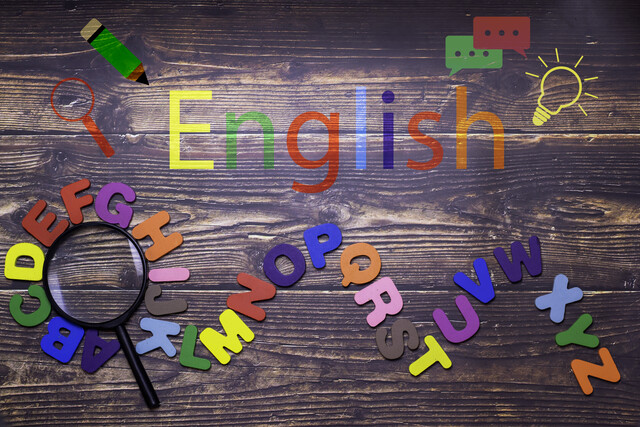Online Class: ESL Grammar Skills Level 4

no certificate
with CEU Certificate*
-
23Lessons
-
36Exams &
Assignments -
735Students
have taken this course -
9Hours
average time -
0.9CEUs
Course Description
Elevate Your English Proficiency with ESL Grammar Level 4
Unveiling the penultimate module in our renowned five-course ESL grammar series: ESL Grammar Level 4. This meticulously curated course acts as a pivotal bridge, effortlessly transitioning English learners from intermediate to the heights of upper-intermediate fluency. It stands as a testament to our commitment to help our students not just communicate, but to truly thrive and articulate with an unmatched sophistication in the English language.
Spread across 22 intricately designed units, this course boasts a streamlined, user-friendly approach. We believe that the mastery of a language doesn't lie in the complexity of content, but in its clarity and relevance. Each unit begins with a lucid presentation of the subject matter, crafted with utmost precision to ensure easy assimilation. This is closely followed by a range of lesson exercises, meticulously tailored to embed the concepts deeper into the learner's cognition.
To guarantee the application and retention of the newly acquired skills, the course features regular practice quizzes, four comprehensive examinations interspersed at strategic intervals, and a decisive final exam. This rigorous, yet engaging assessment method ensures that the learner is constantly aligned with the progression metrics, making the journey to the pinnacle of English mastery a rewarding experience.
Delving into the heart of the course, ESL Grammar Level 4 covers an impressive array of grammar topics. From the dynamism of gerunds and infinitives to the intricacies of future progressive; from mastering the perfect forms of the present to navigating the realms of present, past, and past progressive. We dive deep into the nuanced realms of relative clauses, conditionals 2 and 3, reported speech, and an array of minor yet crucial grammar aspects that often go overlooked in standard courses. This includes intricate details like distinctions between "both/either/neither", nuances in phrases like "a friend of mine", "by the time", "on my own/by myself", and the subtle might of "had better".
But our commitment to holistic learning doesn’t stop at grammar alone. ESL Grammar Level 4 also includes lessons dedicated to refining your writing prowess. Discover the transformative power of conjunctive adverbs and unlock the secrets to crafting impeccable paragraph structures that captivate readers.
On culminating ESL Grammar Level 4, you don't just proceed to another level; you ascend to the zenith of advanced English language learning. Whether you're a first-time explorer of this content or a seasoned enthusiast aiming to polish your expertise, this course is more than a learning tool—it's an investment. An investment into a future of unparalleled English fluency, accuracy, and confidence. Dive in, and let us guide you through the labyrinth of English grammar to the pinnacle of linguistic excellence.
- Completely Online
- Self-Paced
- 6 Months to Complete
- 24/7 Availability
- Start Anytime
- PC & Mac Compatible
- Android & iOS Friendly
- Accredited CEUs

Course Lessons
Lesson 1. Mastering Either/Or and Neither/Nor
 Lesson 1 Video
Lesson 1 Video Review Practice Worksheet: Lesson-1-Activity-18193.pdf
Review Practice Worksheet: Lesson-1-Activity-18193.pdf Lesson discussions: Reasons for Taking this Course
Lesson discussions: Reasons for Taking this Course Complete Assignment: An Introduction
Complete Assignment: An Introduction Assessment: Pre-Test
Assessment: Pre-Test Assessment: Lesson 1 Quiz
Assessment: Lesson 1 Quiz
Lesson 2. Understanding Possessive Phrasing in Friend Descriptions
 Lesson 2 Video
Lesson 2 Video Review Practice Worksheet: Lesson-2-Activity-18195.pdf
Review Practice Worksheet: Lesson-2-Activity-18195.pdf Assessment: Lesson 2 Quiz
Assessment: Lesson 2 Quiz
Lesson 3. Mastering the Present Perfect
 Lesson 3 Video
Lesson 3 Video Review Practice Worksheet: Lesson-3-WorkSheet-18197.pdf
Review Practice Worksheet: Lesson-3-WorkSheet-18197.pdf Assessment: Lesson 3 Quiz
Assessment: Lesson 3 Quiz
Lesson 4. Understanding the Present Perfect Progressive: A Bridge Between Past and Present Actions
 Lesson 4 Video
Lesson 4 Video Review Practice Worksheet: Lesson-4-Activity-18199.pdf
Review Practice Worksheet: Lesson-4-Activity-18199.pdf Complete: Lesson 4 Activity
Complete: Lesson 4 Activity Assessment: Lesson 4 Quiz
Assessment: Lesson 4 Quiz Assessment: Lesson 4-2 Quiz
Assessment: Lesson 4-2 Quiz
Lesson 5. Each vs. Every: Detailed Usage Guide
 Lesson 5 Video
Lesson 5 Video Review Practice Worksheet: Lesson-5-Downloadable-18200.pdf
Review Practice Worksheet: Lesson-5-Downloadable-18200.pdf Assessment: Lesson 5 Quiz
Assessment: Lesson 5 Quiz Assessment: Exam 1
Assessment: Exam 1
Lesson 6. The Syntax of Subjects: Understanding Gerunds and Infinitives
 Lesson 6 Video
Lesson 6 Video Review Practice Worksheet: Lesson-6-Activity-18201.pdf
Review Practice Worksheet: Lesson-6-Activity-18201.pdf Assessment: Lesson 6 Quiz
Assessment: Lesson 6 Quiz
Lesson 7. Understanding Verb Combinations
 Lesson 7 Video
Lesson 7 Video Review Practice Worksheet: Lesson-7-Activity-18204.pdf
Review Practice Worksheet: Lesson-7-Activity-18204.pdf Complete: Lesson 7 Activity
Complete: Lesson 7 Activity Assessment: Lesson 7 Quiz
Assessment: Lesson 7 Quiz
Lesson 8. Verbs and Infinitives
 Lesson 8 Video
Lesson 8 Video Review Practice Worksheet: Lesson-8-WorkSheet-18206.pdf
Review Practice Worksheet: Lesson-8-WorkSheet-18206.pdf Complete: Lesson 8 Activity
Complete: Lesson 8 Activity Assessment: Lesson 8 Quiz
Assessment: Lesson 8 Quiz
Lesson 9. Understanding Object-Infinitive Dynamics in English
 Lesson 9 Video
Lesson 9 Video Review Practice Worksheet: Lesson-9-HomeWork-18209.pdf
Review Practice Worksheet: Lesson-9-HomeWork-18209.pdf Complete: Lesson 9 Activity
Complete: Lesson 9 Activity Assessment: Lesson 9 Quiz
Assessment: Lesson 9 Quiz
Lesson 10. Gerund or Infinitive: A Simple Guide
 Lesson 10 Video
Lesson 10 Video Review Practice Worksheet: Lesson-10-Downloadable-18211.pdf
Review Practice Worksheet: Lesson-10-Downloadable-18211.pdf Assessment: Lesson 10 Quiz
Assessment: Lesson 10 Quiz Assessment: Exam 2
Assessment: Exam 2
Lesson 11. Understanding the Past Perfect: Unveiling Temporal Relationships
 Lesson 11 Video
Lesson 11 Video Review Practice Worksheet: Lesson-11-Downloadable-18214.pdf
Review Practice Worksheet: Lesson-11-Downloadable-18214.pdf Assessment: Lesson 11 Quiz
Assessment: Lesson 11 Quiz
Lesson 12. A Journey Into the Depths of the Past Perfect Progressive
 Lesson 12 Video
Lesson 12 Video Review Practice Worksheet: Lesson-12-Downloadable-18216.pdf
Review Practice Worksheet: Lesson-12-Downloadable-18216.pdf Assessment: Lesson 12 Quiz
Assessment: Lesson 12 Quiz
Lesson 13. Mastering 'By the Time'
 Lesson 13 Video
Lesson 13 Video Review Practice Worksheet: Lesson-13-Activity-18219.pdf
Review Practice Worksheet: Lesson-13-Activity-18219.pdf Complete: Lesson 13 Activity
Complete: Lesson 13 Activity Assessment: Lesson 13 Quiz
Assessment: Lesson 13 Quiz
Lesson 14. Mastering the Future Progressive Tense: Navigating Future Actions with Confidence
 Lesson 14 Video
Lesson 14 Video Review Practice Worksheet: Lesson-14-Downloadable-18221.pdf
Review Practice Worksheet: Lesson-14-Downloadable-18221.pdf Assessment: Lesson 14 Quiz
Assessment: Lesson 14 Quiz
Lesson 15. Mastering Relative Clauses: A Deep Dive into Adjectival Functions
 Lesson 15 Video
Lesson 15 Video Review Practice Worksheet: Lesson-15-HomeWork-18223.pdf
Review Practice Worksheet: Lesson-15-HomeWork-18223.pdf Complete: Lesson 15 Activity
Complete: Lesson 15 Activity Assessment: Lesson 15 Quiz
Assessment: Lesson 15 Quiz Assessment: Exam 3
Assessment: Exam 3
Lesson 16. Imaginary Conditionals: Creating Hypothetical Situations
 Lesson 16 Video
Lesson 16 Video Review Practice Worksheet: Lesson-16-Activity-18227.pdf
Review Practice Worksheet: Lesson-16-Activity-18227.pdf Assessment: Lesson 16 Quiz
Assessment: Lesson 16 Quiz
Lesson 17. The Past That Never Was: Conditional 3 Explained
 Lesson 17 Video
Lesson 17 Video Review Practice Worksheet: Lesson-17-Activity-18230.pdf
Review Practice Worksheet: Lesson-17-Activity-18230.pdf Assessment: Lesson 17 Quiz
Assessment: Lesson 17 Quiz
Lesson 18. Understanding Independence: On My Own and By Myself
 Lesson 18 Video
Lesson 18 Video Review Practice Worksheet: Lesson-18-WorkSheet-18234.pdf
Review Practice Worksheet: Lesson-18-WorkSheet-18234.pdf Assessment: Lesson 18 Quiz
Assessment: Lesson 18 Quiz
Lesson 19. Understanding the Power of 'Had Better' for Advice
 Lesson 19 Video
Lesson 19 Video Review Practice Worksheet: Lesson-19-Activity-18237.pdf
Review Practice Worksheet: Lesson-19-Activity-18237.pdf Assessment: Lesson 19 Quiz
Assessment: Lesson 19 Quiz
Lesson 20. Unlocking the Secrets of Reported Speech
 Lesson 20 Video
Lesson 20 Video Review Practice Worksheet: Lesson-20-StudyGuide-18240.pdf
Review Practice Worksheet: Lesson-20-StudyGuide-18240.pdf Assessment: Lesson 20 Quiz
Assessment: Lesson 20 Quiz Assessment: Exam 4
Assessment: Exam 4
Lesson 21. Sentence Connection Techniques using Conjunctive Adverbs
 Lesson 21 Video
Lesson 21 Video Review Practice Worksheet: Lesson-21-StudyGuide-18244.pdf
Review Practice Worksheet: Lesson-21-StudyGuide-18244.pdf Assessment: Lesson 21 Quiz
Assessment: Lesson 21 Quiz
Lesson 22. Anatomy of a Paragraph
 Lesson 22 Video
Lesson 22 Video Review Practice Worksheet: Lesson-22-Activity-18247.pdf
Review Practice Worksheet: Lesson-22-Activity-18247.pdf Assessment: Lesson 22 Quiz
Assessment: Lesson 22 Quiz
Lesson 23. The Final Exam: Choose Wisely
 Lesson 23 Video
Lesson 23 Video Review Practice Worksheet: Lesson-23-StudyGuide-18250.pdf
Review Practice Worksheet: Lesson-23-StudyGuide-18250.pdf Lesson discussions: Course Completion Poll: Your Thoughts; Course Comments; Program Evaluation Follow-up Survey (End of Course); Course Comments
Lesson discussions: Course Completion Poll: Your Thoughts; Course Comments; Program Evaluation Follow-up Survey (End of Course); Course Comments Assessment: Final Exam
Assessment: Final Exam
Learning Outcomes
- Identify sentences where 'both of,' 'either of,' and 'neither of' must be used correctly to express inclusion or exclusion.
- Recognize the correct usage of 'both,' 'either,' and 'neither' in sentence construction with regard to verb agreement.
- Demonstrate understanding of possessive structures by correctly using 'my friend' and 'a friend of mine' in sentences
- Identify the implied difference in meaning between 'my friend' and 'a friend of mine' based on context usage
- Demonstrate understanding of using ever and never with present perfect in constructing and answering questions about past experiences.
- Identify the correct usage of the present perfect tense in sentences related to ongoing and completed actions.
- Analyze examples to differentiate between the present perfect progressive tense and other tenses by focusing on ongoing actions linking past and present.
- Identify and construct sentences using the present perfect progressive tense to demonstrate the link between past actions and current relevance.
- Demonstrate correct usage of 'each' and 'every' within various grammatical contexts, including their placement in relation to verbs and objects.
- Identify and differentiate between the interchangeable and unique uses of 'each' and 'every' in sentence construction.
- Differentiate between the use of gerunds and infinitives based on the type of action being expressed
- Recognize when to use gerunds and infinitives as subjects in sentences
- Recognize the rules governing verb combinations that require a gerund form for the second verb.
- Demonstrate mastery of lesson content at levels of 70% or higher.
Additional Course Information

- Document Your Lifelong Learning Achievements
- Earn an Official Certificate Documenting Course Hours and CEUs
- Verify Your Certificate with a Unique Serial Number Online
- View and Share Your Certificate Online or Download/Print as PDF
- Display Your Certificate on Your Resume and Promote Your Achievements Using Social Media

Choose Your Subscription Plan
No Certificate / No CEUs
This course only
| Includes certificate | X |
| Includes CEUs | X |
| Self-paced |

|
| Instructor support |

|
| Time to complete | 6 months |
| No. of courses | 1 course |
Certificate & CEUs
This course only
| Includes certificate |

|
| Includes CEUs |

|
| Self-paced |

|
| Instructor support |

|
| Time to complete | 6 months |
| No. of courses | 1 course |
Certificates & CEUs
Includes all 600+ courses
| Includes certificate |

|
| Includes CEUs |

|
| Self-paced |

|
| Instructor support |

|
| Time to complete | 12 Months |
| No. of courses | 600+ |
Certificates & CEUs
Includes all 600+ courses
| Includes certificate |

|
| Includes CEUs |

|
| Self-paced |

|
| Instructor support |

|
| Time to complete | 24 Months |
| No. of courses | 600+ |
Student Testimonials
- "It was a great course. In the level 3, before doing the lesson exam we had to do some practice exercises, which were very useful for understanding the lesson in a better way." -- Pablo B.
- "Very complicated stuff, but it was communicated effectively." -- Brian M.
- "The course was good. It was good to practice what we had studied earlier." -- Pragna P.
Related Courses
-
 17 hours
1.7 CEUs
ESL Basic Grammar and Writing
+ More Info
17 hours
1.7 CEUs
ESL Basic Grammar and Writing
+ More Info
-
 52 hours
5.2 CEUs
ESL Grammar Skills: Level 1-5 Course Bundle
+ More Info
52 hours
5.2 CEUs
ESL Grammar Skills: Level 1-5 Course Bundle
+ More Info
-
 72 hours
7.2 CEUs
Writing Help Course Bundle
+ More Info
72 hours
7.2 CEUs
Writing Help Course Bundle
+ More Info
-
 11 hours
1.1 CEUs
How to Write Effective Policies and Procedures
+ More Info
11 hours
1.1 CEUs
How to Write Effective Policies and Procedures
+ More Info
-
 11 hours
1.1 CEUs
Business Writing
+ More Info
11 hours
1.1 CEUs
Business Writing
+ More Info
-
 11 hours
1.1 CEUs
ESL Basic Writing Skills
+ More Info
11 hours
1.1 CEUs
ESL Basic Writing Skills
+ More Info
-
 14 hours
1.4 CEUs
Journalism 101
+ More Info
14 hours
1.4 CEUs
Journalism 101
+ More Info
-
 11 hours
1.1 CEUs
Writing Effective Emails in the Workplace
+ More Info
11 hours
1.1 CEUs
Writing Effective Emails in the Workplace
+ More Info
-
 7 hours
0.7 CEUs
Basic English Speaking Skills
+ More Info
7 hours
0.7 CEUs
Basic English Speaking Skills
+ More Info
-
 29 hours
2.9 CEUs
Writing Basics 101: Spelling, Grammar, Punctuation, Writing Structures
+ More Info
29 hours
2.9 CEUs
Writing Basics 101: Spelling, Grammar, Punctuation, Writing Structures
+ More Info
-
 9 hours
0.9 CEUs
ESL Grammar Skills Level 5
+ More Info
9 hours
0.9 CEUs
ESL Grammar Skills Level 5
+ More Info
-
 8 hours
0.8 CEUs
Teaching Grammar to ESL Students
+ More Info
8 hours
0.8 CEUs
Teaching Grammar to ESL Students
+ More Info
-
 6 hours
0.6 CEUs
ESL Basic Grammar
+ More Info
6 hours
0.6 CEUs
ESL Basic Grammar
+ More Info
-
 12 hours
1.2 CEUs
How to Write Case Studies
+ More Info
12 hours
1.2 CEUs
How to Write Case Studies
+ More Info




